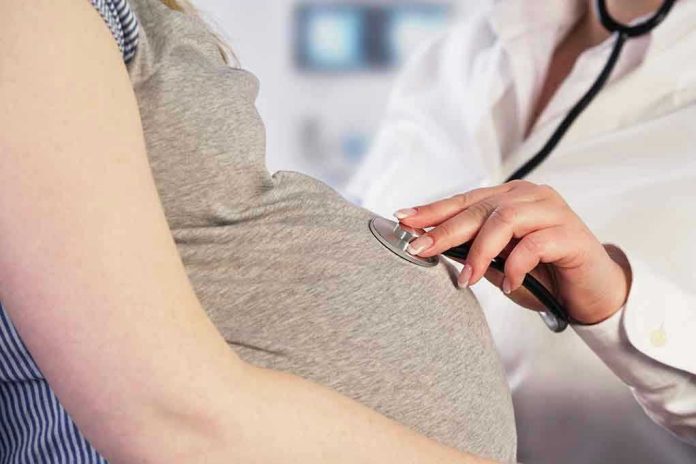
Brittany Watts was ready to welcome her 15th child—but instead, after a devastating miscarriage, she found herself facing felony charges for abuse of a corpse, spotlighting how American women can now be prosecuted for the simple act of losing a pregnancy.
Story Snapshot
- Brittany Watts, a mother of 14 in Ohio, was charged with a felony after suffering a miscarriage at home—an unprecedented legal twist in the aftermath of the Supreme Court overturning Roe v. Wade.
- Hospital staff, following state reporting laws, alerted police after Watts sought care for severe bleeding; her fetus was confirmed nonviable, but the system treated the remains as a potential crime scene.
- A grand jury ultimately refused to indict, but not before Watts endured arrest, national scrutiny, and the trauma of being criminalized during a moment of profound loss.
- This case is not isolated: Over 400 women have faced criminal charges related to pregnancy loss since 2022, a direct consequence of fetal personhood laws and the shifting legal landscape around reproductive rights.
The Human Cost of Legal Ambiguity
Brittany Watts’ ordeal began when she went to the hospital with severe bleeding. Doctors confirmed her fetus was nonviable. Watts miscarried at home, left the remains in her residence, and sought medical care. Hospital staff, bound by mandatory reporting laws, called the police. Officers investigated, and Watts was charged with felony abuse of a corpse—a charge that could have sent her to prison for up to a year. The case quickly became a national symbol of how the law can turn personal tragedy into public spectacle.
She Was Ready to Have Her 15th Child. Then Came the Felony Charges. https://t.co/tsFgc3LFhv By @mensactivism
— Andro Uber Alles (@Andro_UberAlles) November 3, 2025
Watts’ experience is not unique. Since the Supreme Court’s Dobbs decision in 2022, states have enacted a patchwork of laws that increasingly treat fetuses as legal persons. This shift has led to a spike in arrests and investigations of women who experience miscarriage, stillbirth, or other pregnancy complications. Advocacy groups, including Pregnancy Justice, report at least 412 pregnancy-related criminal charges in the two years following Dobbs. Each case represents a woman who, like Watts, faced the dual trauma of loss and legal jeopardy—often after seeking the very medical care meant to protect her.
From Medical Crisis to Criminal Case
The charge against Watts—abuse of a corpse—is typically reserved for cases involving deliberate mistreatment of human remains. Applying it to a woman who suffered a miscarriage is legally novel and ethically fraught. Prosecutors in Trumbull County, Ohio, filed the charge, but the grand jury declined to indict in January 2024. The legal system ultimately recognized the absurdity of the case, but not before Watts’ name, face, and story were dragged through the media and the court of public opinion.
Medical professionals warn that such prosecutions create a climate of fear, deterring women from seeking timely care for pregnancy complications. Legal scholars point out that laws on fetal remains are often vague, leaving room for overzealous enforcement. In states with strict abortion bans, the line between miscarriage and criminal act is increasingly blurred, and women are paying the price. The case of Purvi Patel in Indiana, convicted of feticide after a miscarriage in 2014 (later overturned), and Marshae Jones in Alabama, charged with manslaughter in 2019 after being shot while pregnant, are stark precedents.
The Politics of Pregnancy Loss
The criminalization of pregnancy loss is not a bug in the system—it’s a feature of the post-Roe era. Anti-abortion advocates have long pushed for fetal personhood laws, arguing that embryos and fetuses deserve the same legal protections as born children. Pro-choice advocates counter that these laws are being weaponized against women, turning healthcare decisions into criminal acts. Neutral observers, including some medical and legal experts, call for clearer standards to prevent abuse of the law.
She Was Ready to Have Her 15th Child. Then Came the Felony Charges. https://t.co/kXPe2tjmVs
— Local Beat News (@Local_Beat_News) November 3, 2025
The economic, social, and political impacts are profound. Women who experience miscarriage now face not only grief but also the risk of arrest, legal bills, and public shaming. Hospitals and doctors are caught between patient care and legal liability, sometimes forced to report patients to authorities. Advocacy groups are working to document cases, provide legal support, and push for reforms, but the trend shows no sign of slowing. In the absence of federal protections, state legislatures hold the power to expand or restrict these prosecutions—and the stakes for women’s lives and liberty have never been higher.
Expert Voices and the Road Ahead
Dana Sussman of Pregnancy Justice frames the issue bluntly: “Four hundred and twelve women were charged with crimes that would not have been crimes if they were not pregnant. That is exactly what happens when we give rights and status to embryos and fetuses.” Mary Ziegler, a UC Davis law professor, adds that cases like Watts’ create precedent for treating fetuses as legal persons—a seismic shift in American law and culture. Medical professionals emphasize that criminalization deters women from seeking care, worsening health outcomes for mothers and babies alike.
The Brittany Watts case is closed, but the national conversation it sparked is far from over. As states continue to experiment with fetal personhood and abortion restrictions, more women will find themselves at the intersection of personal tragedy and public policy. The question is no longer whether these cases will happen, but how many more will occur before the legal and political system recognizes the human cost of turning pregnancy loss into a crime.
Sources:
Mother Jones: Pregnancy Justice Fetal Personhood—When a Miscarriage Becomes a Crime
Pregnancy Justice: New Data on Pregnancy-Related Criminal Charges in the First Two Years Since Dobbs



